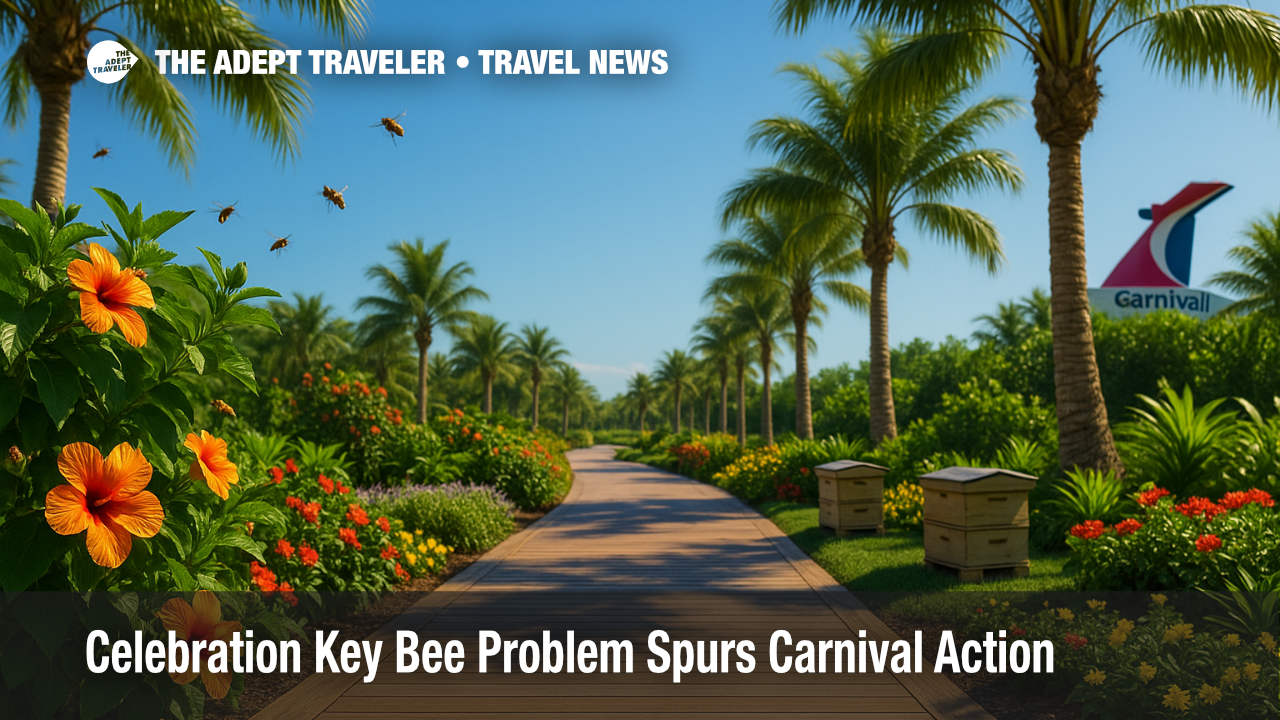Celebration Key Bee Problem Spurs Carnival Action

Carnival Cruise Line's brand-new private destination, Celebration Key on Grand Bahama, is buzzing for the wrong reason. Just two weeks after opening on July 19, guests are reporting persistent swarms of bees in public areas. Carnival says it is relocating hives, trimming nectar-rich plants, and boosting medical supplies to safeguard travelers with allergies. Officials urge guests to carry personal epinephrine and stay alert until mitigation efforts show results later this month.
Key Points
- Why it matters: Swarms of bees are unsettling travelers and pose risks for those with allergies.
- Travel impact: Carnival is relocating hives, changing landscaping, and stocking epinephrine at first-aid stations.
- What's next: Additional vegetation work will continue through August; guests should carry personal medication.
Snapshot
Carnival Cruise Line's brand-new private destination, Celebration Key on Grand Bahama, opened July 19. Barely two weeks later, guests began posting photos and complaints about persistent bee swarms near food courts, loungers, and tram stops. Carnival's brand ambassador John Heald confirmed the issue and outlined immediate steps: professional hive relocation, strategic trimming of flowering plants, and expanded medical support, including epinephrine auto-injectors and over-the-counter sting relief in Pharmabox vending machines. The line urges anyone with known bee allergies to keep medication close until mitigation shows results.
Background
Tropical destinations naturally attract pollinators, but Celebration Key's mix of newly planted flowering shrubs and sugary drinks created ideal conditions for bees to congregate in guest areas. With some 2 million passengers expected in the port's first year, Carnival had already integrated robust environmental protocols. However, the rapid convergence of bees-including imported European honeybees and aggressive Africanized hybrids reported on Grand Bahama-took planners by surprise. Similar swarms have interrupted past sailings on Carnival Valor and other ships, but this is the first large-scale incident at a dedicated cruise destination.
Latest Developments
Mitigation Measures Under Way
Carnival has contracted local beekeepers to humanely relocate hives discovered near Lokono Cove's excursion hub and the Starfish Lagoon snack pavilions. Landscaping crews are replacing high-nectar blooms with less attractive native foliage and installing decoy hives at the property's undeveloped northern edge to lure foragers away from crowds. Heald noted that tram drivers and shore staff are being retrained to spot newly forming swarms and alert a 24-hour response team. Guests will also notice discrete "Bee Awareness" placards advising minimal perfume use and secure drink lids.
Medical Readiness Enhanced
The main first-aid center near Lokono Cove now stocks triple the standard supply of epinephrine auto-injectors, antihistamines, and topical anesthetics. Two satellite aid posts-one at Calypso Lagoon and another beside Pearl Cove Beach Club-mirror those inventories. Carnival confirmed that medical staff completed refresher anaphylaxis drills on July 30, and all lifeguards carry radios programmed with a "Code Bee" priority channel to summon medics within 90 seconds. Over-the-counter sting treatments are available for $7 USD in vending machines placed at tram stops 3 and 7.
Analysis
The incident highlights the challenges cruise lines face when transforming wild coastal acreage into high-capacity leisure hubs. Rapid landscaping often favors visually appealing, nectar-rich plants-an unintended invitation for pollinators. Carnival's swift response aligns with industry precedent: Royal Caribbean installed similar hive-relocation programs at Perfect Day at CocoCay in 2021. The key difference is Celebration Key's scale; at 369 acres, bee management must cover a footprint three times larger than many private islands. Long-term success will hinge on balancing ecological stewardship with guest safety-retaining enough pollinators to sustain vegetation without allowing swarms in high-traffic zones. If mitigation stalls, Carnival risks reputational damage just as it markets the port as its flagship experience. Cruise lines may increasingly consult entomologists during the design phase of new destinations, mirroring how marine biologists now guide reef-safe construction.
Final Thoughts
Until mitigation fully takes hold, travelers with severe allergies should pack auto-injectors, avoid sugary beverages outdoors, and monitor Carnival's pre-cruise health advisories. The line's transparent updates and proactive measures suggest the buzz will fade, but vigilance remains the best defense against the Celebration Key bee problem.
